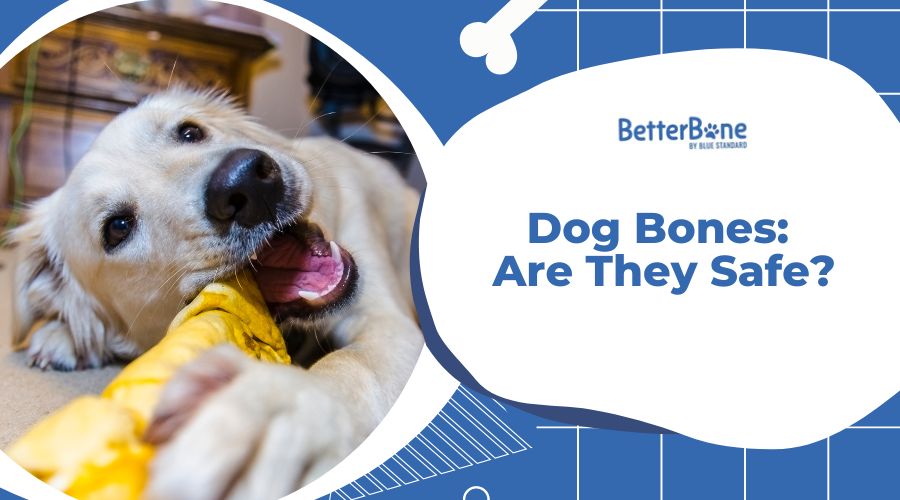We all want the best, high-quality, and safe dog bones for our furry friends. But the truth is, a few dog bones are actually dangerous for dogs and can cause certain health problems.
With that being said, how do you know which dog bones are safe? And what’s the best alternative? Keep reading to find out!
What makes dog bones unsafe?
Most commercially available dog bones are full of unhealthy additives and preservatives. They’re also usually made from low-quality meat that’s not safe for dogs to consume.
Additionally, when dog bones are boiled or roasted, the nutrients are removed, leaving the bone dry and brittle. This makes them more likely to splinter and break, which can cause damage to your dog's digestive system.
Health problems associated with choosing the wrong bone

Contrary to what most shows or cartoons depict, dogs are seriously at risk for health problems from bones. Their digestive system is not designed to digest bones, which can result in a variety of health issues.
One of the most common issues when feeding bones to dogs is intestinal blockage. If they consume a large enough portion, it may partially or fully obstruct the intestinal canal.
Dogs who have gastrointestinal blockage need to be treated with special care and frequent surgery. Symptoms of an intestinal blockage in dogs may include:
- Lethargy
- Loss of appetite
- Vomiting (with or without blood)
- Diarrhea (with or without blood)
- Abdominal pain
- Bloating
- Constipation.
Another serious health concern for dogs who consume bones is dental damage. The hardness of bones can cause teeth to crack or break. In fact, about 25% of all emergency vet visits for dogs are due to fractured teeth.
Dental damage from bones can cause a lot of pain for your dog. They may have trouble eating, drool excessively, paw at their mouth, or become more aggressive. If you think your dog has fractured a tooth, take them to the vet immediately.
Safe dog bones you can definitely get your little one
Bychoosing the right type of dog bones, you can still give your pup the chew time they crave without putting their health at risk.
Here are a few examples of dog bones you can buy:
1) Non-Rawhide Alternatives
It's important that you get your pup a non-rawhide alternative because rawhide is one of the most dangerous things you can give to your dog.
Rawhide bones have an immense amount of chemicals that are harmful to your pet. If that doesn't alarm you, the FDA had several reports of pet parents finding mold, salmonella, and E. coli on rawhide bones.
But of course, not all hope is lost. There are multiple brands that sell non-rawhide alternatives. Read this article to find out more: 5 Non-Rawhide Bones That Will Change Your Dogs' Quality of Life
2) Raw cow bones
Raw cow bones are safe for your pup to chew on and will definitely give them something to sink their teeth into. The chewing action will help remove any plaque or tartar build-up on their teeth and massage their gums.
3) Raw bison bones
Raw bison bones are another safe and yummy alternative for your pup. They're full of protein and essential nutrients that will keep your furry friend healthy and strong.
Tips on how to choose the right dog bone
Choosing the right dog bone can be the difference between a healthy pup and an expensive vet visit. Here are 5 tips on how to choose the right dog bone:
1) Be sure to do your research
It's tempting to buy the first thing you see at the pet store, but it's important that you take the time to do your research. Not all dog bones are created equal and some can be downright dangerous. And if you're ever unsure, ask your veterinarian.
2) Be sure to read the label
You want to make sure that the bone you're buying is safe for your pup to consume. Avoid bones that are made with chemicals or have been boiled or roasted.
3) Choose the right size
When in doubt, go for bigger bones that your pup can't swallow whole. And always supervise your dog while they're chewing on any type of bone.
4) Go for natural bones
You want to make sure that the bone you choose is as close to its natural state as possible. Avoid any bones that have been bleached or treated with chemicals.
5) Know what your dog needs
Every dog chews in a different way. For instance, a Boxer is more prone than a Shih Tzu to chew aggressively. Each dog also has a different penchant for chewing. While some dogs prefer a chew with more give, others prefer a tougher chew.
Additionally, your dog's preferences may alter as they age. When your dog reaches senior status and develops dental problems, the challenging chews they once loved will probably be too challenging.
Choose bones that go well with the temperament, age, and chewing habits of your dog.
The best safe alternative to regular dog bones: BetterBone

If you want a safe and healthy alternative to regular dog bones, we suggest BetterBone Dog Bone.
It’s made with two all-natural ingredients and is still non-toxic, hypoallergenic, nylon-free, non-splintering, and 100% sustainable. Better for your dog and the planet.
Here are a few of the benefits of BetterBone:
- All-natural ingredients
- No artificial flavors or colors
- Grain and gluten-free
- No fillers or preservatives
- Sourced in Europe and Made in the Croatia
Send us a message at hello@thebetterbone.com or visit our website to learn more.










